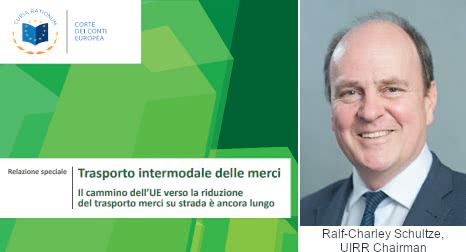
The International Union for Road-Rail Combined Transport (UIRR), the association for the promotion of intermodal road-rail transport in Europe, is fully in agreement with the uncomforting scenario as to infrastructure and standards in which it must operate, and against which it is to fight, the intermodal transport sector of the European Union that has been outlined by the European Court of Auditors in its special report on intermodal freight transport (

of the
March 28 2023). If UIRR, pointing out that the Court highlights a European regulatory framework that is wrong to promote certain modes of transport and is "obsolete, counterproductive or dysfunctional", and is totally in tune with what was found by the institution European, it's a little less

pessimistic about the prospects for the possible growth of the European intermodality, provided EU policymakers believe : " the stagnation of the market share of road transport over the last decade-has warned the president of the association, Ralf-Charley Schultze-should not cause policymakers to believe that modal transfer is not possible or feasible. A critical mass of decisive legislative changes and the right measures of promotion will generate the modal shift necessary to decarbonize the transport of goods, while increasing it at the same time, " the UIRR president said. energy efficiency and reducing all other externalities. "
Contrary to the conclusions of the European Court of Auditors, the UIRR underscored, one way to develop intermodal transport is and is the one indicated by the study "Roadmap to Zero-Carbon Combined Transport 2050" elaborated at the end of last year. year from the European consulting firm d-fine on behalf of the UIRR, whereby the doubling of the market share of rail freight can be achieved by 2050 (  of the November 29 2022). The association recalled what conditions to enable this development : EUR 460 billion (EUR 16.5 billion per year) of investments in the railway infrastructure aimed at the transport of goods and 47 billion euros (1.5 billions of euros per year) of investments in intermodal assets, as well as the adoption of correctives to the TEN-T Regulation, to the Energy Tax Directive and the Combined Transport Directive as well as the definition of new rules on the management of railway capacity.
of the November 29 2022). The association recalled what conditions to enable this development : EUR 460 billion (EUR 16.5 billion per year) of investments in the railway infrastructure aimed at the transport of goods and 47 billion euros (1.5 billions of euros per year) of investments in intermodal assets, as well as the adoption of correctives to the TEN-T Regulation, to the Energy Tax Directive and the Combined Transport Directive as well as the definition of new rules on the management of railway capacity.
In this regard, the UIRR has urged European lawmakers to carry out the amendment of the Energy Tax Directive so as to internalize any externalities related to the burning of fossil fuels. 